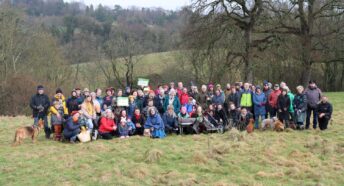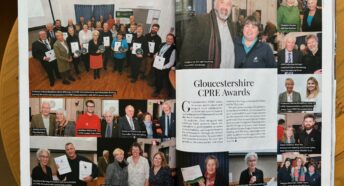News headlines from national CPRE
In this news briefing from national CPRE, there is a a message for the new government from our CEO, Crispin Truman, a report on an uncertain future for County Farms, and a plea that school visits should be a part of the national curriculum.
1. A message for the new government from our CEO, Crispin Truman
‘We’re urging the new Conservative government to invest in rural communities to ensure the countryside can thrive and that those communities are not left behind. The new government needs to address urgent challenges such as providing genuinely affordable homes, supporting rural businesses, and investing in de-carbonised public transport.
‘We are also urging the new government to tackle the climate emergency, which is one of the biggest threats the countryside faces. The Conservative manifesto was light on environmental policy, and of all the main parties it had the least ambitious target to achieve net zero emissions. That’s why we’re calling on Johnson and his team to take a much bolder approach to green issues.
‘Johnson claimed in his speech this morning that he wanted the UK to be the greenest and cleanest in the world. Therefore, plans must be announced in the first 100 days of his new term to invest in renewable energy, invest in public transport, improve the energy efficiency of our homes and shift farming from a carbon source to a carbon sink.
‘CPRE stands ready to work with the new government to achieve these vital changes.’
2. We are at risk of losing the benefit of County Farms
Council-owned county farms are in terminal decline, which means future generations of young farmers – and our communities more broadly – won’t benefit from these wonderful assets, according to a new report recently published by CPRE.
County farms were set-up at the end of the 19th century to provide a way into farming for young farmers and have a huge potential to generate income, provide an opportunity to promote innovative farming methods and deliver environmentally sustainable farming to help tackle the climate emergency. Their decline is significant with 15,000 acres (7%) of council-owned farmland lost in the past decade alone. This alarming trend, warns the report, could continue unless new legislation that protects county farms for future generations is introduced.
The report Reviving County Farms, was prepared for CPRE by the New Economics Foundation,Shared Assets and Who Owns England? It shows that:
• more than 50% of county farm estates have disappeared over the past 40 years;
• almost 60% of county farmland sold since 2010 has been in the past two years;
• austerity, coupled with a sense that county farms are ‘a thing of the past’, and an unwillingness by some councils to innovate to develop new income streams or business models, is driving the decline of county farms;
• councils that have taken very different approaches, leading them to protect and even expand their county farm estates, have yielded positive results;
• county farms could play an important role in addressing the climate emergency and also deliver benefits to local communities, such as providing locally-grown food for nearby schools; and
• seven out of nine councils that responded to the survey gave details of environmental and social benefits provided by their county farms, ranging from tree planting, to local education initiatives, to supporting new farmers.
3. Countryside school visits should be part of the national curriculum
A survey of 2,000 parents across England, carried out by OnePoll, and commissioned by CPRE, reveals that:
• 85% of parents in England think that every schoolchild should be able to experience the countryside first-hand as part of the national curriculum;
• 96% think it is important for children to spend time in the natural world, including the countryside (with 69% saying this is very important and 27% saying it is quite important);
• the top five reasons cited by parents for why children should spend time in nature were:
1) Boost physical health (74%)
2) Learn more about nature and science (74%)
3) Boost their mental health (70%)
4) Experience the thrill of observing wildlife first-hand (65%)
5) Understand why we should protect the countryside (64%)
Separate research by CPRE shows that 36% of England’s population live too far from the current network of 10 National Parks and 34 AONBs for these areas to be classified as easily accessible.
CPRE has included improved access to green spaces for everyone in their 12 recommendations for how the next government can harness the potential of the countryside to promote a healthier economy and happier communities.
Children’s author and co-founder of Farms for City Children Michael Morpurgo, and business woman and environmentalist Emma Bridgewater have added their voices to this call to action. They would like to see the next government make sure that everyone, including every schoolchild, has access to National Parks and AONBs.
Michael Morpurgo, author and co-founder of Farms for City Children, said:
“It should absolutely be part of every child’s life to walk the fields and forests, stomp through leaves, up hills, through rivers, to see buzzards floating high and mewing, to glimpse a fish jumping, to feel wind and cold, to see a sheep give birth, a cow give milk, to plant potatoes, dig potatoes, to look up on a dark night and see the stars, to hear silence. How good is that for us, to know that this world is beautiful and that we are part of it.”
Emma Bridgewater, President of CPRE, said:
“Younger people are leading the way in changing the way we treat our planet. Programmes like Blue Planet have done so much to raise awareness of the need to recycle and have succeeded in building awareness of the impact of climate change among children and young people. But we all have a responsibility to continue to support children on their journey towards making our world truly sustainable. We have many amazing green spaces on our doorstep, which benefit everyone in so many ways – by improving their mental health and physical wellbeing through the ability to experience nature first-hand. What is needed is decisive action from the next government that will ensure all children can access these treasured areas and green landscapes.”
Crispin Truman, Chief Executive of CPRE, said:
“The climate emergency is high on the political agenda and yet the recently-published political party manifestos suggest that policy makers have failed to recognise how experiencing nature directly links with the desire and will to combat the climate emergency. The research also shows that parents see the countryside as good for children’s health and well-being. “CPRE therefore urges the next government to introduce measures to improve access to the countryside for all, including the 30 million who have the Green Belt on their doorstep, so our green spaces can be a focal point for experiencing, learning about and investing in our environment.”








